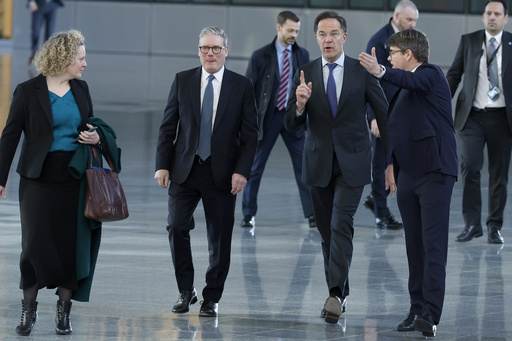
LONDON — On Monday, Keir Starmer, the leader of the British Labour Party, is set to make history by becoming the first prime minister from the U.K. since its departure from the European Union five years ago to attend a meeting with EU leaders in Brussels. Starmer’s attendance at a dinner at the elegant Egmont Palace underscores his ambition to mend the frayed relationships with the EU, while simultaneously navigating the complex dynamics with the United States under the leadership of President Donald Trump.
During this time of economic uncertainty, Trump has enacted tariffs on major trading partners, including Canada, Mexico, and China, and has hinted at potential tariffs directed at the EU, where the U.S. currently holds a trade deficit. His comments regarding the U.K. have been notably mixed, as he recently remarked, “the U.K. is out of line but … I think that one can be worked out,” indicating the need for negotiations. Starmer has emphasized his intention to foster a positive relationship with the U.S., with his office underscoring an existing “fair and balanced trading relationship.”
Just prior to the dinner in Brussels, Starmer engaged with NATO leader Mark Rutte and asserted that the U.K. need not choose between aligning with Europe or the United States. In remarks to the press, he articulated the significance of both relationships, stating, “If you look at our vital interests, it’s really important we work with both, that we don’t see it as an either-or.” He also expressed optimism regarding the importance of maintaining strong trading ties, referencing the ongoing intense discussions between the U.S. and EU regarding tariffs.
Starmer’s efforts to mend ties with the EU come amidst the complications stemming from ongoing trade tensions exacerbated by Trump’s policies. He has expressed a desire to reduce bureaucracy and eliminate some of the barriers to trade imposed post-Brexit. However, he has ruled out key options such as rejoining the EU’s customs union or single market, which would provide considerable relief and facilitation of trade between the U.K. and EU. Additionally, he has pushed back against EU calls for a mobility agreement that would allow young Britons and EU citizens to live and work in each other’s regions temporarily.
Navigating the delicate landscape of domestic politics, Starmer and his Labour Party seek to avoid inflaming tensions with populist figures such as Nigel Farage, who could capitalize on any perception that the government is undermining the Brexit mandate. Instead, Starmer is focusing on more manageable reforms, such as easing the processes for artists to tour and streamlining the recognition of professional qualifications, alongside fostering closer collaboration on law enforcement.
While EU leaders have welcomed the shift in tone from Starmer compared to his Conservative predecessors, they are eager for tangible proposals and are likely to require compromises from the U.K. A comprehensive leaders’ summit is anticipated to occur later in the year to further discuss these matters.
Ahead of the Brussels discussions, Starmer reiterated the United Kingdom’s commitment to maintaining pressure on Russia through sanctions aimed at disrupting its military operations in Ukraine. The return of Trump to political prominence has raised concerns regarding U.S. steadfastness towards support for Ukraine and NATO. Trump has advocated for a significant increase in defense spending among NATO allies, suggesting a target of at least 5% of GDP instead of the current 2%. The U.K. is currently at 2.3% but has plans to bolster it to 2.5%.

